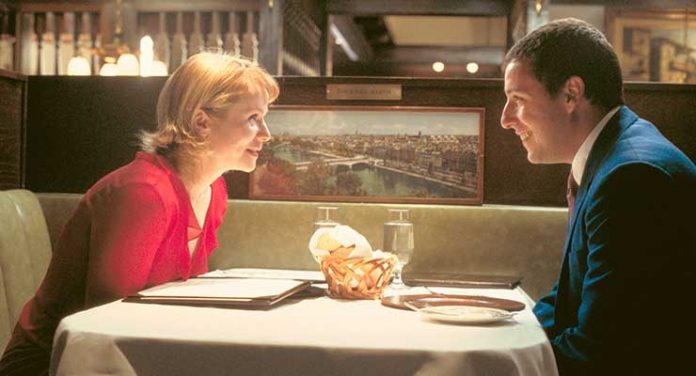
The highly peculiar film starred comedian Adam Sandler in an eccentric dramatic role as sad and lonely, hotel supply business owner Barry Egan whose seven sisters have worn him down so much with their teasing that he has a lot of repressed anger and rage that occasionally manifests itself as violent outburst. Early on Punch-Drunk Love, Barry dials in to a phone sex line, which results in his credit card information being stolen and a slime ball named Dean Trumball (Anderson regular, the late Philip Seymour Hoffman) extorting him for money and sending a group of thugs after him. This all happens just as Barry begins dating and falling in love with Lena Leonard (Emily Watson), a co-worker of one of Barry’s seven sisters.
Anderson’s film is a tightly woven fiction that balances his good ear for music (Jon Brion scores the film with his equally eccentric percussive, and sweeping orchestral sounds) and keen eye for visuals. Where his previous three films all dealt with people struggling to build familial relationships, this one focused on the desperation of, once again, the lonely struggling to find romantic relationships and cling to them as tightly as possible. Sandler gives a surprisingly reserved performance, his usual comedic quirks here coming across as sad, layered, and sympathetic, no doubt thanks to Anderson’s direction and the softening of Emily Watson’s co-lead. Watson plays off of Sandler perfectly and is a true charmer as his romantic redemption in this topsy-turvy world Anderson sculpts, interspersed with surreal digital art from Jeremy Blake and an almost eerie sounding Shelly Duvall crooning “He Needs Me” from Anderson mentor Robert Altman’s 1980 live-action Popeye.
[envira-album id=”94322″]
The Video
Punch-Drunk Love is a new digital transfer from a 35mm interpositive supervised by director Paul Thomas Anderson. It looks exceptionally crisp with a superb layer of grain and excellent color saturation. The blue of Sandler’s suit really radiates, as does Emily Watson’s red sweater top. The scenes set outdoors in Hawaii have nice warmth to them, setting them apart from the rest of the film’s cool palette. Criterion Collection provides the transfer in an AVC 1080p encodement in its original 2.39:1 framing.
The Audio
The original 5.1 soundtrack was remastered from a 35mm magnetic track. It’s supplied in a DTS-HD Master Audio track that is clean and full. Jon Brion’s score has punchy low- and mid-range. The surround channels, though used sparingly, do bring good balance into the mix and there is one scene where sound effects are spun around the room in a dizzying fashion, but it fits in with the storytelling and visuals.
The Supplements
We get a signature array of extras from the Criterion Collection offered up on this release. It combines both old and new supplemental materials. I found the most interesting piece to be the featurette with composer Jon Brion.
- Deleted Scenes:
- The Sisters Call (2.35:1; 1080p/24; 00:07:18)
- “Are You From California?” (2.35:1; 1080p/24; 00:02:23)
- Mattress Man Commercial (1.33:1; upscaled 1080i/60; 00:00:52)
- Blossoms and Blood (2.35:1; 1080p/24; 00:11:58)
- Scopitones (1.78:1; 1080p/24; 00:06:20):
- First
- Harp Finger
- Punchy Doorbell
- Mysterio
- Boy Businessman
- Healthy Choice
- He Needs Me
- Lena
- Come and Get Me
- Exit Love Story
- Sissy Lake’s Love
- Waimanalo Walk
- Jon Brion – This interview with Punch-Drunk Love’s composer, Jon Brion, was produced for the Criterion Collection in 2016. Also presented is footage from one of the orchestra sessions for Brion’s score:
- Interview (1.78:1; 1080p/24; 00:27:19)
- Recording Session (1.33:1; upscaled 1080i/60; 00:09:56)
- Jeremy Blake – Jeremy Blake (1971 – 2007):, a noted digital artist and painter, created the abstract imagery featured in Punch-Drunk Love. In this conversation, recorded for the Criterion Collection in 2016, New York gallerist Lia Gangitano, founder of Participant Inc., and curator Michael Connor, artistic director of Rhizome at the New Museum in New York, discuss Blake’s work on the film and his career as a whole. Also presented is some additional artwork Blake created for Punch-Drunk Love.
- Gangitano and Connor (1.78:1; 1080p/24; 00:20:25)
- Additional Artwork (2.35:1; 1080p/24; 00:02:42)
- Cannes Film Festival, 2002 – Paul Thomas Anderson won the best director award at the Cannes Film Festival in 2002 for Punch-Drunk Love, and the film was nominated for the Palme d’Or. The following are brief studio interviews with members of the cast and crew conducted for the festival, along with the press conference for the film.
- Studio Interviews (1.33:1; upscaled 1080i/60; 00:07:02)
- Press Conference (1.78:1; upscaled 1080i/60; 00:37:52)
- The Pudding Guy (1.33:1; upscaled 1080i/60; 00:05:04) – Civil engineer David Phillips’ accumulation of over a million frequent-flyer miles through a Healthy Choice promotion was the inspiration for a plotline in Punch-Drunk Love. This is a 2000 interview with Phillips that aired on NBC.
- Trailers:
- Theatrical Trailer (2.35:1; 1080p/24; 00:02:27)
- Jeremy Blake’s Love (2.35:1; 1080p/24; 00:01:24)
- “Eat Tomorrow” (2.35:1; 1080p/24; 00:00:33)
- Essay on the film by filmmaker, novelist, and Sundance Delegate Miranda July.
The Final Assessment
Punch-Drunk Love has a decidedly European feel in its flow and free use of art and music to help tell its story. It almost reminds me in a way of Amelie in some respects, only less lighthearted. Anderson won the 2002 Best Director prize at the Cannes Film Festival for Punch-Drunk Love.
Be the first to leave a review.


